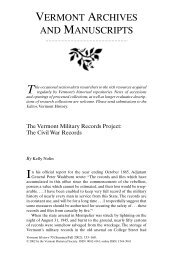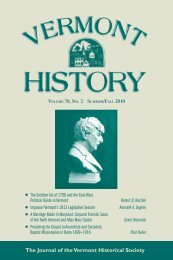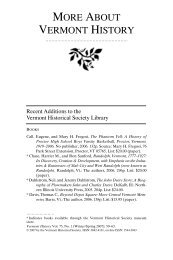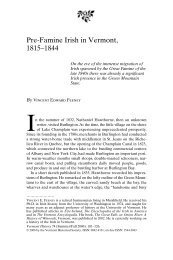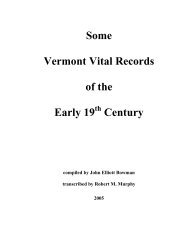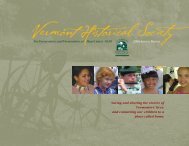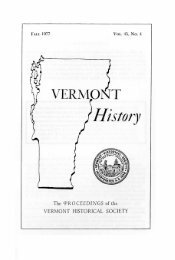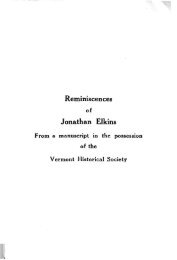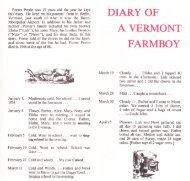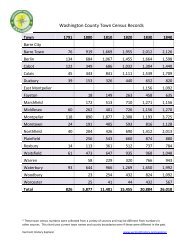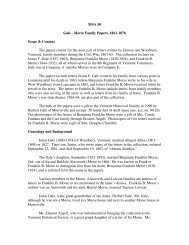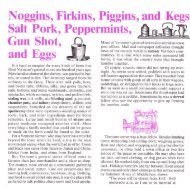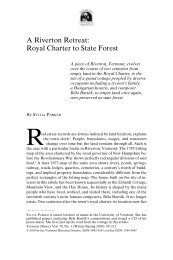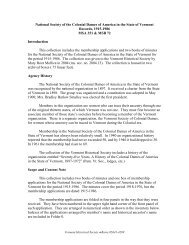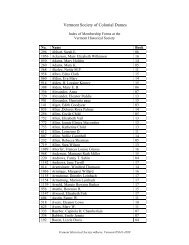The Missisquoi Loyalists - Vermont Historical Society
The Missisquoi Loyalists - Vermont Historical Society
The Missisquoi Loyalists - Vermont Historical Society
You also want an ePaper? Increase the reach of your titles
YUMPU automatically turns print PDFs into web optimized ePapers that Google loves.
His Excellency would do all in his power to prevent misunderstandings<br />
between the frontier settlers. 14<br />
A few days later Ira Allen renewed his complaint of further outrages<br />
instigated by the "diabolical machinations of some individuals<br />
residing at St. Johns," and enclosing additional depositions. 1G John<br />
Johnson tf.Stified that the Indians had come to Swanton with an interpreter<br />
and had warned the inhabitants to move or they would burn<br />
their houses and kill the cattle. A settler replying that the land belonged<br />
to Colonel Allen, the Indian chief drew his knife and threatened<br />
to scalp Colonel Allen; whereupon the Abenakis had helped<br />
themselves to one sheep and several canoe-loads of corn and beans in<br />
lieu of rent. According to Jonathan Butterfield, James Hunter of<br />
St. Johns had sworn in his presence that if Colonel Allen came to that<br />
place, that he would put a ball in his head or place him in irons under<br />
guard. Thomas Butterfield averred that he had heard the same<br />
James Hunter swear that he would send the Indians to burn all the<br />
houses, kill the cattle, and drive Colonel Allen's people from the<br />
River.<br />
To this second letter Mathews replied on October II, 1784, that<br />
orders had" been given to investigate the causes of the dispute on the<br />
spot, and at the same time he wrote to Lieutenant Colonel Campbell<br />
at St. Johns, desiring him to examine into the disputes between the<br />
St. Francis Indians and Ira Allen's settlers. 16 Colonel Campbell's<br />
interposition proving effective, all was quiet and serene at Swanton<br />
for several years.<br />
However, in 1788, the Indians gave some further trouble and Ira<br />
Allen addressed his complaints to Sir Guy Carleton, who had returned<br />
to Canada as Governor GeneraJ.l 7 Colonel Campbell was again<br />
called upon to intervene, through an order from Sir John Johnsen,<br />
Superintendent General of Indian Affairs. In this instance, the two<br />
complainants, John Waggoner and William Tichout, with their interpreter,<br />
John Hilliker, declined a personal meeting with the Indians<br />
concerned, for which Colonel Campbell presumed to think unfavorably<br />
of their complaint. As a matter of fact, all three of these men,<br />
Waggoner, Tichout, and Hilliker, were <strong>Loyalists</strong> and ex-Loyal<br />
Rangers who had settled in <strong>Vermont</strong>.<br />
14. Canada Archi'lJes, 1886, p. 451.<br />
15. Haldimand Papers, Book] 75, p. 288.<br />
16. Canada Archi'lJu, ]886, p. 453.<br />
]7. <strong>Vermont</strong> <strong>Historical</strong> Magazine, Hemenway, Vol. 4, PP' 998-1000.<br />
[ 137 ]



